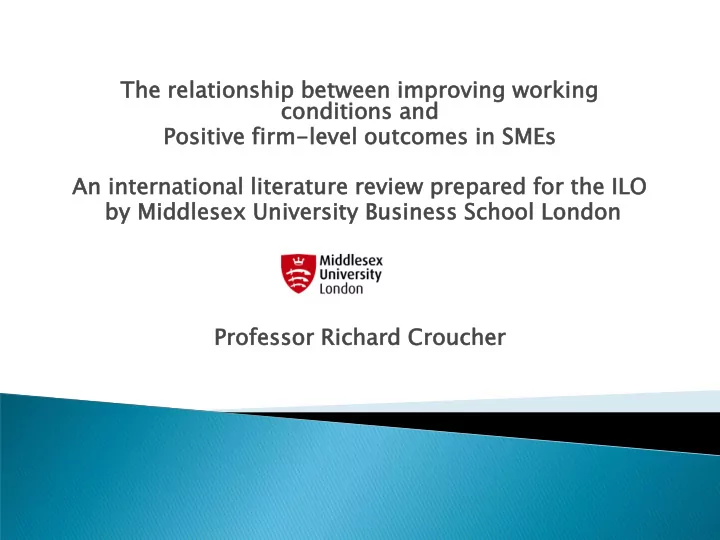

The e relationship ionship between n improvin ving g working ng condi ditio tions ns and Positive ive firm-lev evel l outcomes mes in SMEs An internat rnational ional literature ture review ew prepared ed for the ILO by Middlesex ex Univers versit ity y Busines ness School ol London Profes essor or Richard hard Croucher cher
to review the current state of knowledge on the relationship between improving working conditions (as related to the ILO’s Decent Work agenda) and positive firm -level outcomes in SMEs internationally. Definitions ‘SMEs’; since there is a range of (EU, ILO etc.) definitions we accepted those used by researchers whose work we were reviewing. ‘Improving working conditions’: we accepted into the review both this general term and studies examining Occupational Safety and Health, wages, working time, training and combinations (‘bundles’) of practices examined as a whole. ‘Positive firm - level outcomes’: we accepted those identified by authors. They generally presented these as: improved productivity, higher profitability, improved rates of innovation, better staff retention, reduced employee turnover and improved customer satisfaction
-Project methods -Key findings: Occupational Safety and health -Key findings: Bundles of practice -Key findings: Wages -Key findings: Working time -Key findings: Training -Overall conclusions
Multi-disciplinary and multi-lingual research team of twelve academics from Middlesex University Business School formed to search for, review and synthesise research on the relationship in collaboration with the ILO. Over 100 relevant items of research, mainly in English but also in French and German identified and reviewed by at least two researchers per item, and reported on through an agreed evaluation template. Particular attention paid to finding relevant research on the developing world and to gender dimensions. Theoretical framework developed based on resource-based view and social equity theory. Standard criticisms of this type of work (e.g. on method, direction of causation) borne firmly in mind. Inclusion and exclusion criteria based on works meeting acceptable scholarly standards; peer- reviewed publications and similar included. Results synthesised and circulated first to research team and then to ILO for critique and comment in three rounds, December 2012-April 2013.
Findings in this area show characteristics of much of the research overall, in a particularly marked form Little work on developing world SMEs Considerable evidence of a link between good OSH practice and positive firm outcomes; many studies focus on tools treating OSH as essential to good business practice and quality management. But evidence for a long-term link across a sufficient range of organisations is inadequate. SME owner/managers often unaware of cost implications of accidents and ill- health; adopt reactive rather than proactive approaches and take short rather than long-term views Effectiveness of growing trend in developed countries towards ‘light touch’ regulation is contested. Some evidence for positive effects of easy-to-apply interventions by international agencies and MNCs up the supply chain especially where they are sensitive to company, sector and national contexts.
Combinations (bundles) of good practice have most effect on firm performance in terms of productivity, innovation, staff retention and customer satisfaction These are most clearly effective in the long term This is as relevant to SMEs as other companies The direction of causation from the practices to the outcomes has been clearly established in some studies. BUT very few studies on developing world SMEs
Firms in general can establish positive firm level outcomes and establish competitive advantage through payment of relatively high wages Some developed country research has shown positive productivity effects in SMEs associated with increased minimum wages. Positive relationships are also in evidence in high-tech SMEs where employees are higher up national earnings distributions. Most positive results are evident where comparatively high wages are simply part of a bigger bundle of practice. Results for SMEs (where gender pay gaps are often large) are often ambiguous. The nuances of minimum wage law and enforcement can be important. Convincing studies of causal links lacking for the developing world.
Important gender issue Flexible working can be associated with increased productivity and performance in SMEs. Sensitive introduction (cf Lewis method) of flexible working appears to assist in improving mutual gains outcomes Often hard to measure in SMEs because of the informality of flexible working in these companies. Few studies of SMEs; need for more longitudinal studies in SMEs especially given their short term orientation.
Training of all types (definitional issue: what is it?) is generally associated with positive financial outcomes in companies of all sizes, at the international level. Given their concern with short-term survival, training in small firms is weak for ‘ignorance of benefits’ and ‘high cost in relation to projected returns’ reasons SME training is characterised by its mainly informal nature, direct relevance to the job, low cost and focuses on guaranteed immediate returns. Most SME training is therefore highly specialised SME training in the developing world remains a ‘black box’ and informal training’s results are therefore not measured.
Literature provides strongest support for (strategic) Bundles of Practice and their relationships with all types of positive outcomes. Evidence for the relationship between individual practices and outcomes is generally weaker How far this exists in the developing world’s SMEs where strategic approaches to HR are relatively unusual is open to question; no solid literature exists on this. Much more work is needed especially on these relationships in SMEs in the developing world, including in gender issues. Much more detail is available in our substantial review.
Recommend
More recommend